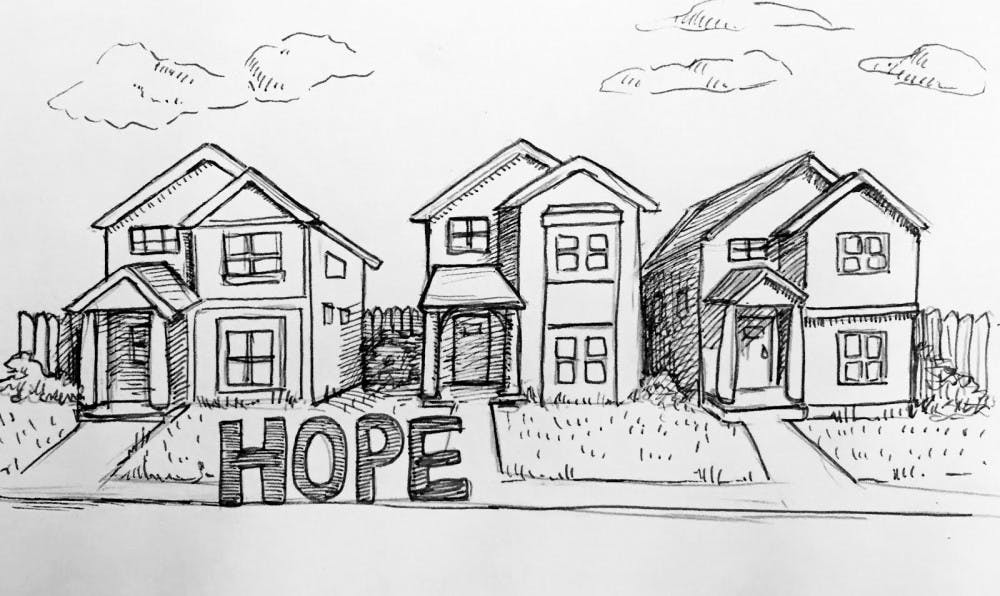In his Sept. 16 op-ed, José Soria ’19 called for “the creation of an undergraduate and graduate student coalition that can help protect the rights of students as tenants with their respective landlords.” As members of Housing Opportunities for People Everywhere, the student-run housing and homelessness organization, we were pleased to see Soria help begin an important conversation about housing in Providence. Soria hit the nail on the head with his observations — Providence rents are too damn high, landlords can be greedy and no one in a position of power looks out for renters, leaving them to fend for themselves in an unforgiving market.
As students ourselves, we know that Soria’s proposal makes complete sense. But as individuals who, through HOPE’s combination of direct service and advocacy work, engage with folks experiencing homelessness every week, we believe that expending energy on such a coalition is a misallocation of limited resources, effort and time.
Providence — like so many cities in this country — is in the midst of a massive housing crisis. Soria observed that the rent he pays is three to four times what online resources suggest it ought to be — an experience familiar to many students. Undoubtedly, greedy landlords hoping to take advantage of students are a part of this. But to come to a more complete conclusion about why rent in Providence is so high, we, as Brown students, have to look past the Van Wickle gates; for this is not a problem that only impacts us. In fact, to a certain extent, it is a problem for which we share part of the blame. According to HousingWorks RI’s 2017 Fact Book, “more than one in two renters in Rhode Island are housing cost-burdened, meaning they are spending more than 30 percent of their income on housing.” At the lowest end of the income scale, this figure jumps to a frighteningly high seven in ten renters.
Why is the rent so high? There are many reasons. For one thing, Providence, unlike many of its regional neighbors, lacks any legislation that would limit or “stabilize” how much landlords can increase the rent from year to year. Additionally, in Rhode Island, it is perfectly legal for landlords to deny potential renters who use government-issued housing assistance. But there’s also the simple fact that Rhode Island has failed, and continues to fail, to invest in affordable housing. While neighbors like Massachusetts and Connecticut annually spend $99.72 and $76.98 per capita, respectively, on affordable housing, Rhode Island spent just $8.46 in 2016.
Still, this framing of the housing crisis excludes an integral piece of the problem: Brown University. Over the past several decades, Brown’s increasing physical and societal footprint in Providence has dramatically reshaped much of the East Side. Not long ago, for instance, a thriving Cape Verdean population lived in Fox Point, but with the expanding demand of housing from Brown students and faculty, and consequent rise in property value, little remains of this community. Many a time, while on Nighttime Outreach, we have often heard older folks talk about how they once called the East Side home, before the rise of Brown and the Rhode Island School of Design forced them out. Granted, the actions that resulted in these displacements happened long before the current cohort of students arrived in Providence, but the fact remains that we are part of an institution that significantly impacts the Providence housing market, and not necessarily in a positive way for the community.
When we, as Brown students, talk about housing, we often have the luxury of framing our conversation in terms of Keeney Quadrangle versus Pembroke or on-campus versus off-campus. But the reality for far too many of our neighbors is much starker. None of this is to say that the University shouldn’t reevaluate its own housing policies, as Soria suggests. It’s without question that these prices are far too high and that they place a tremendous burden on many of our students and their families. However, as residents of a state deeply entrapped in a housing crisis, we should be critical about how we frame our housing conversations on College Hill and beyond.
When we consider ways to address these problems, solving them from the comfort of our campus will not suffice, for any effort taken solely by the University will fall short of addressing the roots of the problem. Instead of exclusively looking out for our own self-interests, HOPE believes that Brown students should look for ways in which we can throw our tremendous weight — a product of both our privilege and the virtues and skills that helped us get into this school — behind efforts that support community organizations who have engaged in this work for decades and will continue to do so, long after many of us leave Rhode Island.
Jacqlyn Blatteis ’19 and Nathaniel Pettit ’20 are co-directors of HOPE. They write on behalf of the HOPE leadership team and can be reached at jacqlyn_blatteis@brown.edu and nathaniel_pettit@brown.edu.





